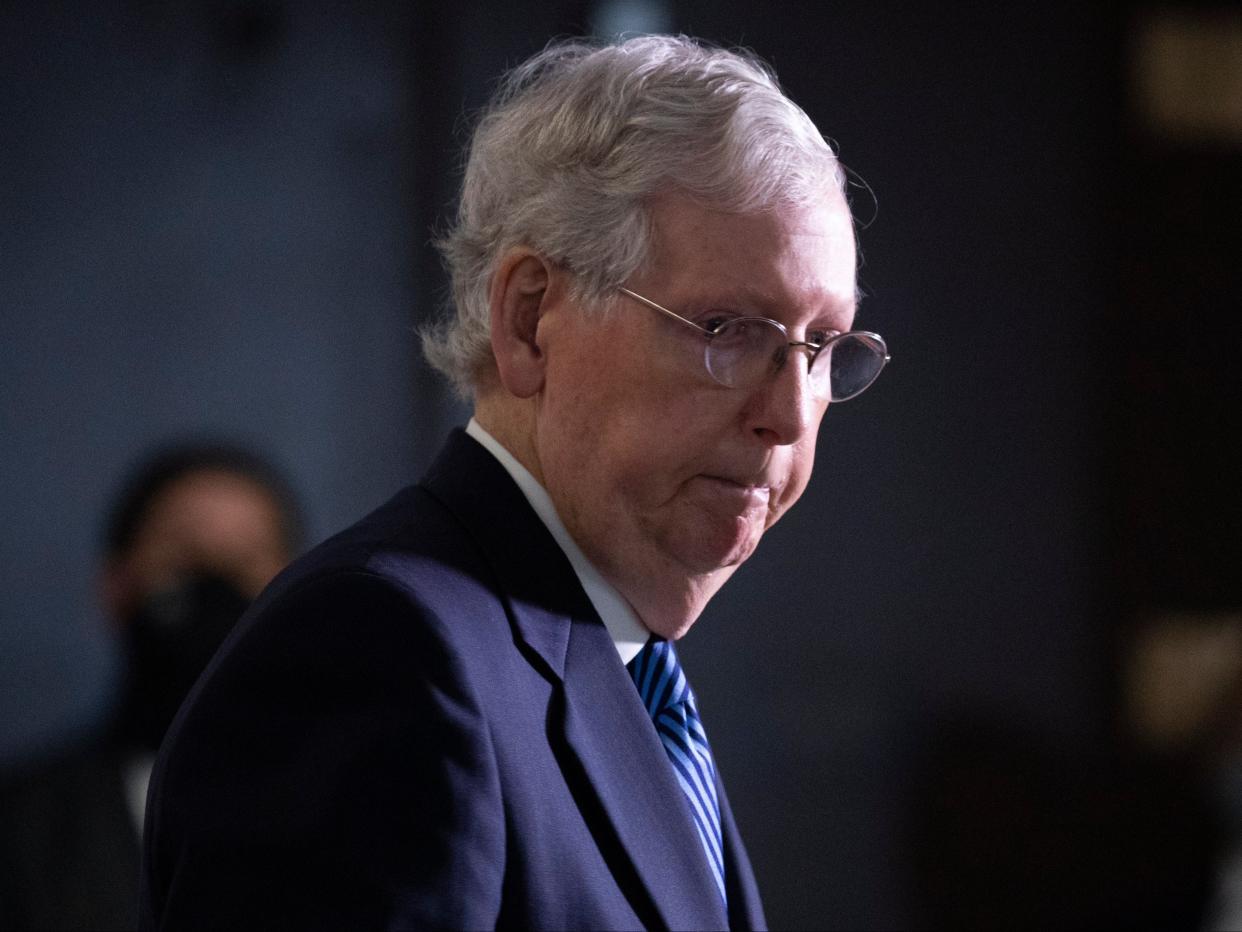Trump and Mitch McConnell move closer to securing GOP support for Senate vote on Supreme Court pick before election

Senate Majority Leader Mitch McConnell is closing in on securing the votes needed to potentially confirm Donald Trump’s third conservative Supreme Court nominee before November’s election to decide which party control the White House and both chambers of Congress.
The president made clear Monday morning that he wants the upper chamber to vote before 3 November, telling “Fox & Friends” in another telephone interview that he thinks there is ample time to move his coming nominee through a process that typically includes meetings with each senator and public confirmation hears, followed by floor debate and a simple-majority vote.
That leaves Mr McConnell and his top lieutenants working behind the scenes to convince at least 50 of their 53-senator caucus to get on board with Mr Trump’s desired timeline. The majority leader has already lost two GOP members, Susan Collins of Maine and Lisa Murkowski of Alaska. He can lose only one more.
Losing two more would leave Vice President Mike Pence, who can vote as president of the Senate under the Constitution, unable to cast the 51st and deciding vote in favor of a coming nominee Mr Trump said on Monday would be “young” and someone who “abides by the Constitution.”
The president and Mr McConnell moved closer Sunday evening to locking in enough votes for one of the speediest confirmation processes in US history when two GOP senators considered institutionalists announced they are fine with a pre-election vote.
“No one should be surprised that a Republican Senate majority would vote on a Republican president’s Supreme Court nomination, even during a presidential election year, retiring GOP Senator Lamar Alexander said in a statement. “Senator McConnell is only doing what Democrat leaders have said they would do if the shoe were on the other foot.”
Because he is not seeking re-election, some Senate watchers had opined that Mr Alexander might put maintaining what’s left of the Senate’s decorum as well as allowing voters to weigh in above getting a sixth conservative on the high court. He chose the latter.
So, too, did Ohio Senator Rob Portman, also fingered as an institutionalist and who hails from a swing state.
“Leader McConnell has said that he will hold a vote on any nominee President Trump sends to the Senate, and I intend to fulfill my role as a U.S. Senator and judge that nominee based on his or her merits,” Mr Portman said in a statement. "The president was elected in 2016, in part, based on a commitment to nominate men and women to the judiciary who would fairly and impartially apply the law and protect the rights guaranteed by the Constitution, not advance public policy goals by legislating from the bench.”
Like several of his GOP colleagues did on the Sunday morning political talk shows, Mr Portman suggested centuries of history are on his party’s side.
“Since the 1880s, no Senate has confirmed an opposing-party president’s Supreme Court nominee in a presidential election year,” he said. “In contrast, when the presidency and the Senate are controlled by the same party, the precedent is for the president’s nominees to get confirmed. In the 19 occasions that a vacancy has occurred when the President and the Senate are of the same party, the Senate has confirmed the nominee and filled the seat in every instance but one.”
To that end, Mr Trump claimed during his Fox call-in that, if Democrats controlled both the White House and Senate, they would also try filling the vacancy before Election Day.
Then-President Barack Obama tried just that in 2016, nominating Judge Merrick Garland to the high court during his final year. One difference: He did so with nearly a year until that presidential election. There are just 43 days left this time.
Mr Trump said Monday he intends to announce his nominee Friday or Saturday, after all services for the late Justice Ginsburg have concluded out of “all due respect.” If he waits until Saturday, there would be just 38 days for the Senate to look into his nominee’s background and legal cannon, prepare for and hold public confirmation hearings, then move to debate on the chamber floor and a final vote.
Mr Trump, far from an upper chamber expert, on Monday declared “we have a lot of time” before 3 November.
On Sunday, Ms Murkowski said otherwise.
"I did not support taking up a nomination eight months before the 2016 election to fill the vacancy created by the passing of Justice Scalia,” she said in a statement. “We are now even closer to the 2020 election – less than two months out – and I believe the same standard must apply," she said in a statement.
She has bucked, and irked, the GOP president before. He issued a warning on Fox, saying he expects voters in Alaska will remember her decision on the SCOTUS vote timing.
“She’s not up for two years,” he said, referring to her next re-election race. “I think it will follow her.”
Read more
'Abuse of power': Biden hits out at Trump move to replace Ginsburg ahead of election
Trump to announce SCOTUS nominee by Saturday and has shortlist of five
Trump mocks RBG’s dying wish and claims it was invented by ‘Pelosi or Schumer’
Trump dares Nancy Pelosi to impeach him again to delay Supreme Court process in Senate


